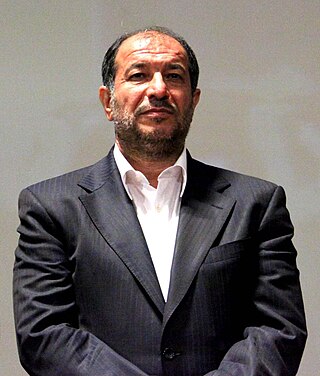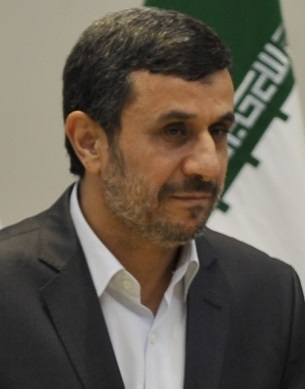
Ali Ardeshir Larijani is an Iranian politician and former military officer in the Islamic Revolutionary Guard Corps, who served as the Speaker of the Parliament of Iran from 2008 to 2020. He has been a member of the Expediency Discernment Council since 2020, having previously served from 1997 to 2008. Larijani filed for candidacy in the 2024 presidential election, but was ultimately disqualified. He previously ran in 2005, but was disqualified from running in 2021.

Mostafa Mohammad Najjar is an Iranian politician and retired IRGC general. He was interior minister of Iran from 2009 to 2013 and minister of defense in the first cabinet of Mahmoud Ahmadinejad from 2005 to 2009. He is also a veteran of the IRGC.

Muhammad Taqi Misbah YazdiGiwachi was an Iranian Shia scholar, political theorist and philosopher who served as the spiritual leader of the Front of Islamic Revolution Stability.

Fathi Ibrahim Abdulaziz Shaqaqi was a Palestinian physician, leader and the founder and Secretary-General of the Palestinian Islamic Jihad (PIJ), a Palestinian Islamist paramilitary organization.

The dynamic between the League of Arab States and the Islamic Republic of Iran has been ambivalent, owing to the latter's varying bilateral conduct with each country of the former. Iran is located on the easternmost frontier of the Arab League, which consists of 22 Arab countries and spans the bulk of the Middle East and North Africa, of which Iran is also a part. The Arab League's population is dominated by ethnic Arabs, whereas Iran's population is dominated by ethnic Persians; and while both sides have Islam as a common religion, their sects differ, with Sunnis constituting the majority in the Arab League and Shias constituting the majority in Iran. Since Iran's Islamic Revolution in 1979, the country's Shia theocracy has attempted to assert itself as the legitimate religious and political leadership of all Muslims, contesting a status that has generally been understood as belonging to Sunni-majority Saudi Arabia, where the cities of Mecca and Medina are located. This animosity, manifested in the Iran–Saudi Arabia proxy conflict, has greatly exacerbated the Shia–Sunni divide throughout the Muslim world.

Yossi Melman is an Israeli writer and journalist. He was an intelligence and strategic affairs correspondent for the Haaretz newspaper, and in 2013 he joined The Jerusalem Post and its Hebrew sister paper Maariv in a similar, more analytical role covering also military issues. In 2019 he returned to Haaretz.
The following lists events that happened during 2006 in Iran.

Mahmoud Ahmadinejad is an Iranian principlist and nationalist politician who served as the sixth president of Iran from 2005 to 2013. He is currently a member of the Expediency Discernment Council. He was known for his hardline views and nuclearisation of Iran. He was also the main political leader of the Alliance of Builders of Islamic Iran, a coalition of conservative political groups in the country, and served as mayor of Tehran from 2003 to 2005, reversing many of his predecessor's reforms.
Ardeshir Hosseinpour was an Iranian nuclear scientist, physics professor, and electromagnetism expert, who was involved in the Iranian nuclear program. He died mysteriously in early 2007 during his nuclear work at Isfahan.

Aluf Eitan Ben Eliyahu is a retired major general in the Israel Defense Forces and was the Commander of the Israeli Air Force (IAF).

Mojtaba Samareh Hashemi is an Iranian politician. He was a "senior adviser" to Iranian president Mahmoud Ahmadinejad and deputy interior minister for political affairs. He is said to have "strong ties to the Revolutionary Guard Corps and to the intelligence services" and to be "a constant presence at the president's side, in every cabinet meeting and during midday prayers at the office..." and acting "more as a cross between Iran's Karl Rove and a [American] president's chief of staff."

Massoud Ali-Mohammadi was an Iranian quantum field theorist and elementary-particle physicist and a distinguished professor of elementary particle physics at the University of Tehran's Department of Physics. Alimohammadi was the first PhD graduate student in physics of the Sharif University of Technology. He published some 53 articles and letters in peer-reviewed academic journals and wrote and translated several physics textbooks, including Modern Quantum Mechanics, revised edition, by J. J. Sakurai, which he translated from English into Persian in collaboration with Hamidreza Moshfegh.

The Presidency of Mahmoud Ahmadinejad consists of the 9th and 10th governments of the Islamic Republic of Iran. Ahmadinejad's government began in August 2005 after his election as the 6th president of Iran and continued after his re-election in 2009. Ahmadinejad left office in August 2013 at the end of his second term. His administration was succeeded by the 11th government, led by Hassan Rouhani.

Iran convened a conference titled "International Disarmament and Non-proliferation: World Security without Weapons of Mass Destruction" on 17 and 18 April 2010 in Tehran. The theme of the conference was Nuclear Energy for All, Nuclear Weapons for No One.

The foreign policy of the Mahmoud Ahmadinejad administration was the policy initiatives towards other states by the former President of Iran, as different from past and also future of the Iranian foreign policy. Ahmadinejad's tenure as president came at a time of greater conflict, rhetorical or physical, than his predecessors. In following this there were various measures, external or internal, that led to his policy changes. This was primarily a division between relations with states of the Western world and the rest of the world.

Iran and Lebanon have diplomatic relations, with embassies in each other countries. Since the Iranian Revolution in 1979, the two countries have deepened relations amidst controversy in Lebanon and abroad.

Tamir Pardo is the former Director of Mossad, taking over the role from Meir Dagan on January 1, 2011. The appointment was announced by Israeli prime Minister Benjamin Netanyahu on November 29, 2010. He served in the role from 2011 until 2016.

The 16th Summit of the Non-Aligned Movement was held from 26 to 31 August 2012 in Tehran, Iran. The summit was attended by leaders of 120 countries, including 24 presidents, 3 kings, 8 prime ministers and 50 foreign ministers.

Yosef "Yossi" Meir Cohen is an Israeli intelligence officer.
Fereydun Sahabi is an Iranian academic, writer, translator, and social activist. He was the first president of the Atomic Energy Organization of Iran and the second in the administration of President of Iran after the Iranian revolution.















